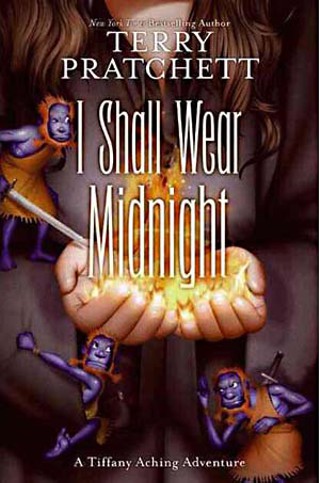 There’s a moment of sadness with every new Terry Pratchett novel. Since the English comedy-fantasy author’s 2007 announcement that he has Alzheimer’s disease, he’s admitted that each book may be his last. He’s undoubtedly bringing one part of his legacy to a bittersweet conclusion with the final tale of Tiffany Aching, the young witch on the mystical planet called Discworld. Across the first three books in the sequence of young adult novels (The Wee Free Men, A Hat Full of Sky, and Wintersmith), Tiffany went from callow apprentice to respected hag o’ the hills.
There’s a moment of sadness with every new Terry Pratchett novel. Since the English comedy-fantasy author’s 2007 announcement that he has Alzheimer’s disease, he’s admitted that each book may be his last. He’s undoubtedly bringing one part of his legacy to a bittersweet conclusion with the final tale of Tiffany Aching, the young witch on the mystical planet called Discworld. Across the first three books in the sequence of young adult novels (The Wee Free Men, A Hat Full of Sky, and Wintersmith), Tiffany went from callow apprentice to respected hag o’ the hills.
Aided and occasionally hindered by the wild and raucous Nac Mac Feegle clan (half-pixie, half-Pictish warriors, all comic relief), Tiffany is the voice of common sense in the earthy farming community of the Chalk. Pratchett is never one to blanch at the grimmer realities of life, and he uses his impish humor to leaven a tale of all too familiar social woes like teen pregnancy and mob violence. Normally, that’s nothing a young witch like Tiffany can’t deal with, but when one family argument turns violent, the conflict creates enough space to let a dark force called the Cunning Man inject himself into the world with deadly intent.
It’s a rich narrative broth here, and it helps that no fantasy novelist is better at world-building than Pratchett. But forget sorting hats and pet dragons: It’s all about headology, the Discworld term for psychology. That’s the real power of witches, getting people to do what they want without using spells. Magic is dangerous, unpredictable stuff, and a sensible, young witch like Miss Aching knows the best way to deal with elves and sorcerers and the like is an iron frying pan to the face. But what to hit when your enemy has no face? The Cunning Man is a classic Pratchett villain, less an entity and more a force of raw, blind emotion.
The battle in this morality tale isn’t wands vs. broomsticks but fear vs. smarts, and that’s pure Pratchett country. He chronicles Tiffany’s final battle and her passage into womanhood with a seasoned pen that, even after nearly 50 novels, is still fresh and joyous. When it comes to headology, he’s still the chief wizard.